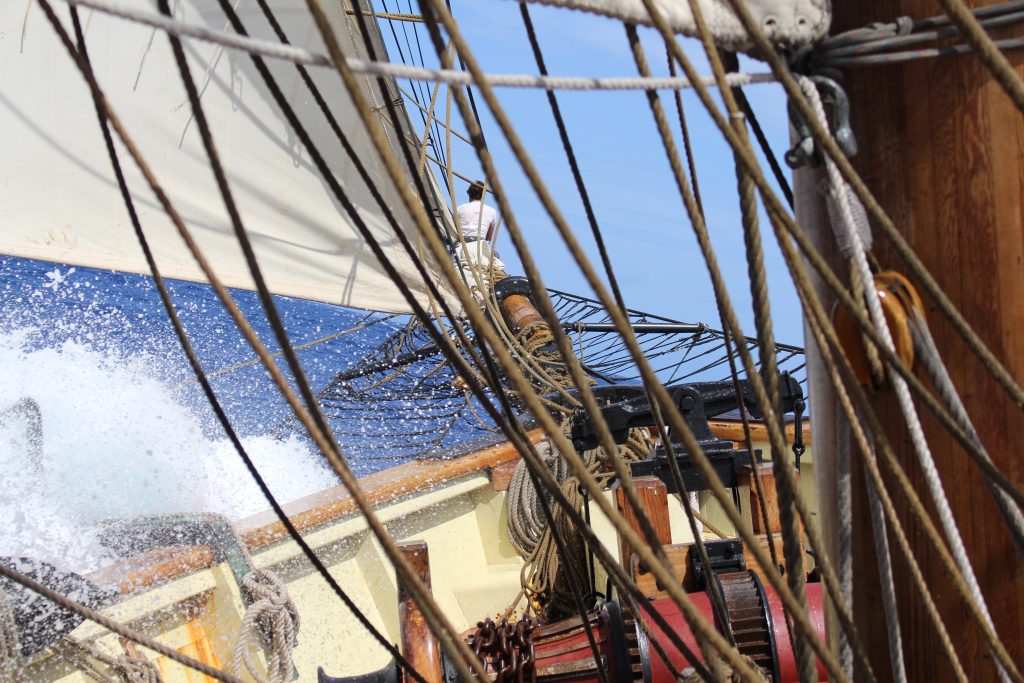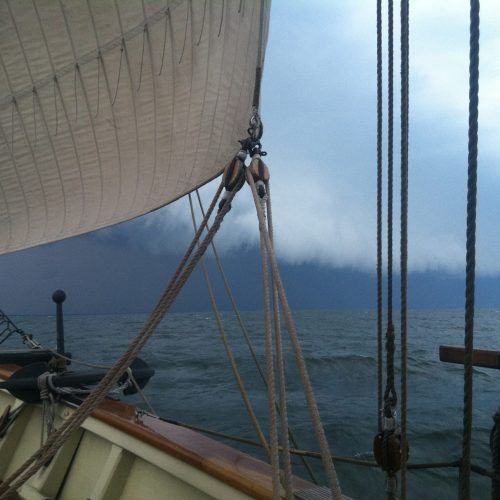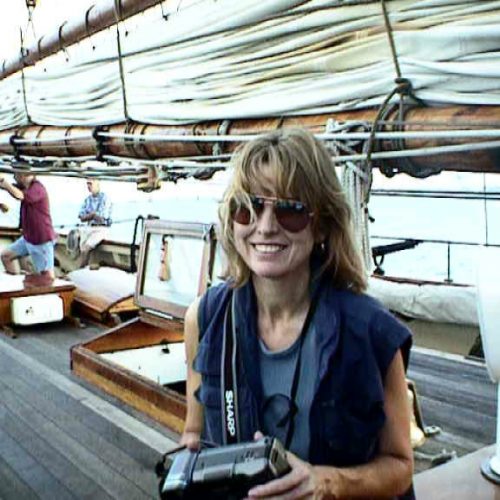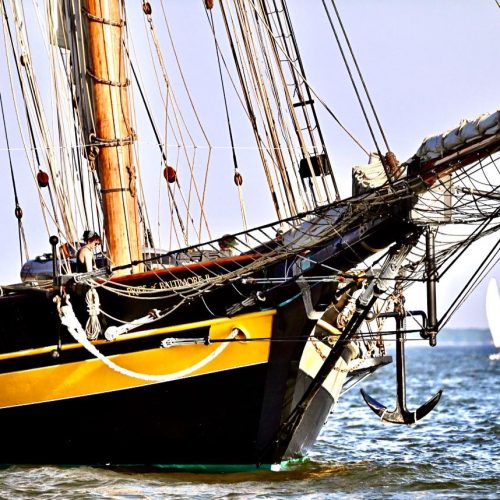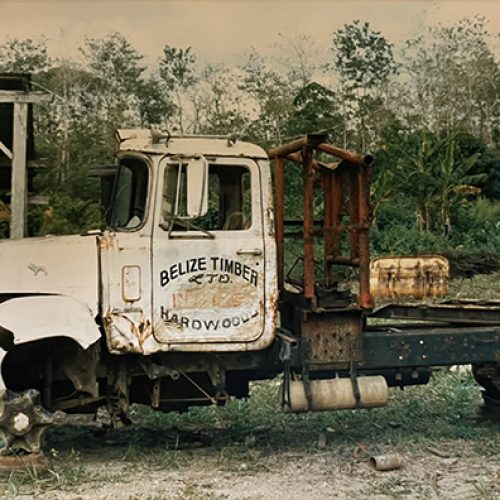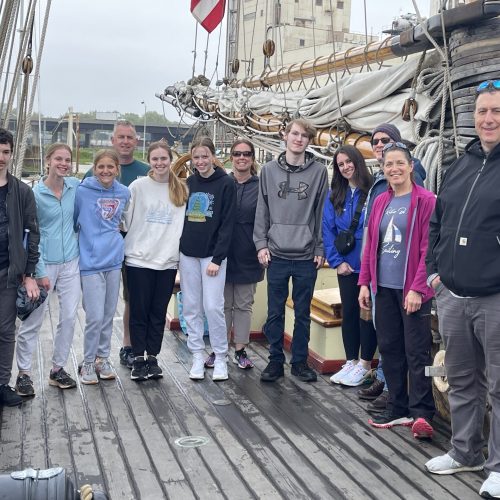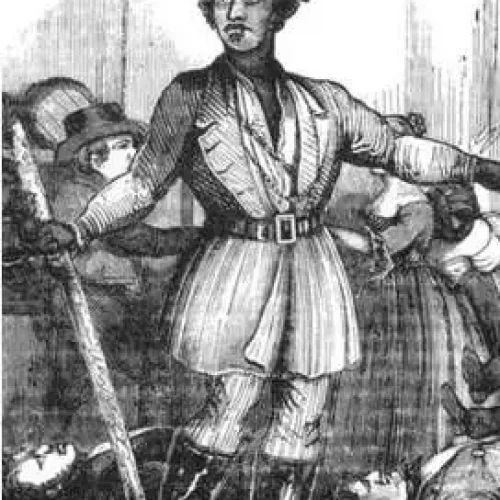Date: Friday, May 26, 2017
Position: St. George’s, Bermuda
Bermuda or (and..?) Bust
We finished the race from Charleston to Bermuda last evening. For days leading up to the start of this race, we watched the weather developing, and knew it was going to be a bit of a wild ride. You know how many people squawk about weather forecasting — how they are wrong as often as right? Well, they got it right this time. The forecast was for winds SW to S, nearly always between 20 and 30 knots (occasionally higher) and this is precisely what we got. In one sense, it was a pretty uncomplicated race — the wind shifted direction very little, so it was mostly a matter of staying on the rhumb line and keeping the gas pedal mashed down. The complicated part was going as fast as possible without having the ship go to pieces.
The least wind of the whole race was at the start, which was at 2 p.m. on Monday, May 22 — about 10 to 12 knots from the southwest. We began with full sail on a broad reach, with everything set (on Pride, this means the main, main gaff topsail, foresail, square topsail, topgallant, weather stuns’l, staysail, jib, and jib topsail). In these lighter conditions, our main competition, the schooner When and If, was able to hold onto us pretty well. As day turned into evening, the wind steadily built, and Pride began to pull away.
As we got to the wee hours of Tuesday morning, we experienced the thing they say about the frog in a slowly heating pot of water: it gets used to the temperature, and because it increases so slowly, it doesn’t know it’s boiling until it’s boiled. The wind built to over 20 knots, and with full sail up (minus the stuns’l) it became a very fast, very wild ride, exacerbated by a dark night with no moon. Eventually, we shortened sail a bit, and went through the first part of the following day with four lowers and foretopsail, averaging well over 10 knots.
Around midday, a very steep wave knocked us down. The seas were averaging around 7 to 10 feet, but occasionally a few of them would roll themselves together and make something bigger and nastier. This knocked us over pretty far — we submerged the swivel gun atop the caprail. The boom dipped in the water, and the resulting forces pulled the boom jaws off the mast, breaking its securing parrel and five of the mast hoops. Our cook, Phil, was making biscuits down below at the time, and, after a bit of a tumble, wound up with the mixing bowl of flour upended and resting on his head, looking like a shellshocked British Tommy at the Somme. We lowered the main to make repairs, and were still going 10 and 11 knots without it! After spending a couple hours jury rigging, the wind moderated and we set the main with one reef.
Later that evening, the wind built again, and we went to double reef the main. The reef line parted, so we went with a triple reef. That, basically, was the end of the worst of it. We slowly packed on more and more sail (sort of a frog in a bucket of cool water with an ice cube being added every few minutes, if you will) for the remainder of the race. For a couple of them, this involved spreading them out on deck and patching them, and setting them as soon as the last thread had been clipped. We turned downwind onto a broad reach at the waypoint at the southwestern extremity of the Bermuda Seamount, and sailed the last 40 miles with everything set once again, rolling comfortably downwind at 9 and 10 knots.
The overall cumulative effect of 3 days and a few hours of this stuff on the ship’s standing crew and six guest crew is not inconsiderable. They worked very, very hard; there was a ton of load on everything; their home was heeled over and leaping about in a most inconsiderate manner; and their bunks were wet. Just getting around the boat — just getting from your bunk to the salon or going to brush your teeth — can be a contact sport in conditions like we had. Many of them had not done sailing like this before, especially on a vessel as high spirited and high powered as Pride, and I must say they performed admirably. Everyone aboard has a few bruises, a few scrapes, and myriad aches and pains.
We are secure at Pennos Wharf in St. George’s, Bermuda, as I write this. We are spending the day putting the ship back to rights, drying out everything, and getting rid of all the salt, which has gotten more or less everywhere, above deck and below. At some point, we will all get used to a home that isn’t behaving like an angry horse trying to shed its rider.
Signed,
Captain Jordan Smith

